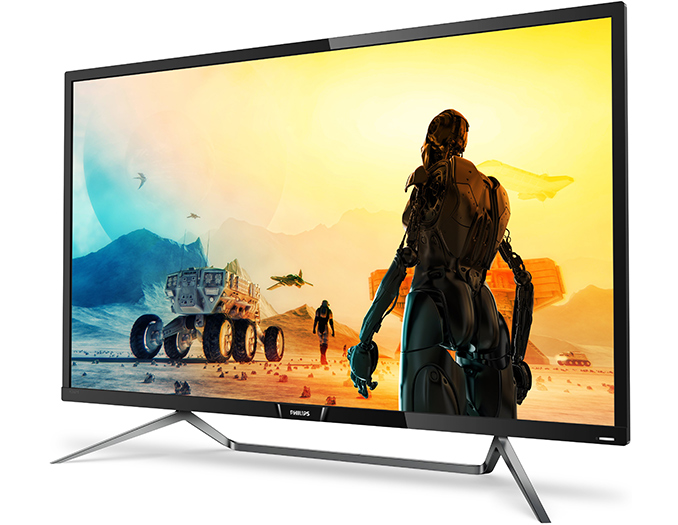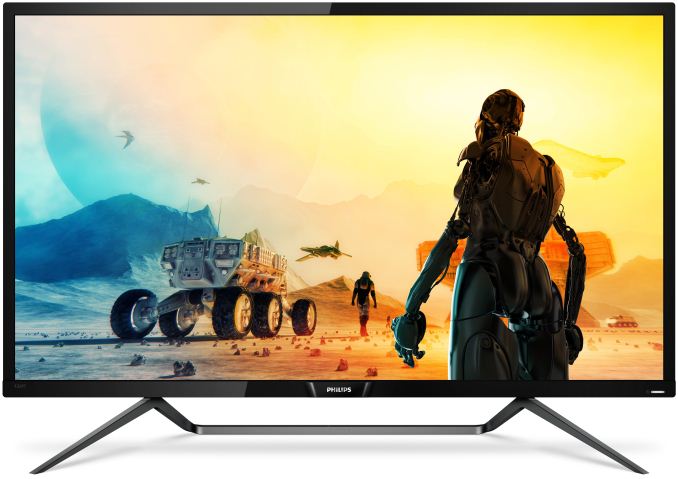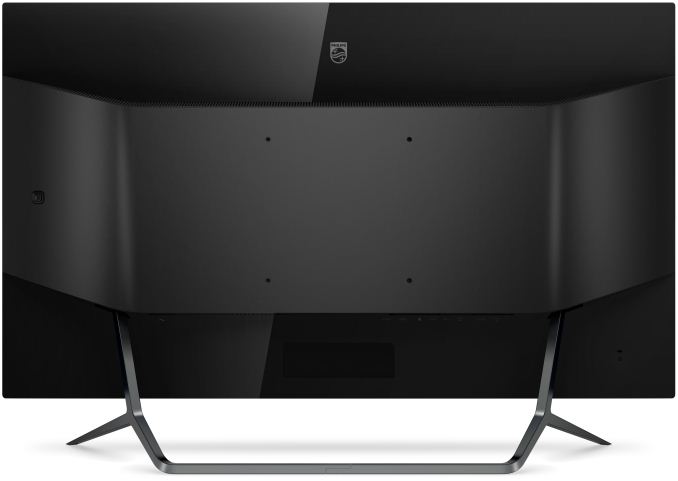Philips Momentum 43-Inch 4K DisplayHDR 1000 DCI-P3 Gaming LCD Now Available
by Anton Shilov on July 2, 2018 11:00 AM EST- Posted in
- Monitors
- Displays
- Philips
- FreeSync
- TPV
- DCI-P3
- HDR
- DisplayHDR
- Philips 436M6VBPAB

Philips has started sales of its Momentum 436M6VBPAB ultra-high def gaming LCD, which happens to be one of the world’s first shipping monitors to obtain the DisplayHDR 1000 certification. Pricing of the product varies from country to country and from store to store, but in general its retail price is in line with a rather moderate sub-$1000 MSRP announced a couple of months ago.
The Philips Momentum 43-Inch at a Glance
The Philips Momentum 436M6VBPAB is based on a 43-inch 8-bit + FRC MVA panel featuring a 3840×2160 resolution, 720 – 1000 nits brightness (typical and peak), a 4000:1 contrast ratio, a 4 ms response time, 60 – 80 Hz refresh rate (optimal and overclocked), 178°/178° viewing angles, and so on (check out all the specs in the table below). A major selling point of the display it its Quantum Dot-enhanced backlighting that enables it to cover an above-average 97.6% of the DCI-P3 color gamut as well as 100% of the sRGB color range. The monitor is AMD FreeSync certified, however we haven't seen the FreeSync minimum refresh rate. So it's unclear whether this monitor supports a wide enough range for LFC. Though even if the LCD’s FreeSync ranges are far from what hardcore gamers might want, it is still good to have a dynamic refresh rate tech rather than not have it at all on a 43-inch gaming monitor.
The 43-inch Philips Momentum was the industry’s first display to get the DisplayHDR 1000 logo from VESA (the second monitor to get the badge was the ASUS ROG Swift PG27UQ, which is now also shipping). This means that it complies with VESA’s rather strict requirements for brightness (600 nits full-screen long duration minimum, 1000 nits full-screen flash minimum) and black levels (corner maximum limit of 0.05 nits and tunnel maximum limit of 0.1 nits). The latter are particularly hard to get even on a VA panel, and all but requires local dimming. Philips hasn't published anything here, but from reports I've seen elsewhere, it sounds like they're using a 32 zone edge-lighting system.
The Philips 436M6VBPAB has four display inputs: 1x DisplayPort 1.2, 1x Mini DisplayPort 1.2, 1x HDMI 2.0, and 1x USB Type-C that can be used both for display connectivity and as an upstream port for a USB 3.0 hub. As expected from an ultra-large LCD, the unit supports Picture-in-Picture and Picture-by-Picture capabilities from two sources. As for audio, the display has a 3.5-mm audio input, 3.5-mm audio output as well as two built-in 7-W speakers with the DTS Sound badge. Finally, the 43-incher comes with a remote controller that can be used to control the monitor as well as other devices connected using HDMI (e.g., media players, game consoles, etc.), which is particularly handy as the huge LCD will clearly be used for watching content.
To read more about the Philips Momentum 43-inch monitor you can check out the original material covering the product as we move to the topic of the news story — availability and prices.
Pricing and Availability
The Philips Momentum 436M6VBPAB is currently available from Amazon in the U.S., Germany, France, Spain, and Japan. Since the product is very special and probably is in high demand, its prices at Amazon in Europe seem to be somewhat inflated. Good news is that a number of stores in Austria, Germany, Poland, and Nordic countries are selling (or at least taking pre-orders) on the 43-inch gaming LCD at its MSPR of €799 or even below that.
| Pricing and Availability of the Philips Momentum 436M6VBPAB | ||||
| Retailer | Country | Local Price | Equivalent in USD | |
| Amazon | U.S. | $1,000 | $1,000 | |
| Germany | €990 | $1,159 | ||
| France | €1,081 | $1,265 | ||
| Spain | €1,081 | $1,265 | ||
| Japan | ¥106,205 | $959 | ||
| MediaMarkt | Germany | €869 | $1,017 | |
| Otto | €790 | $925 | ||
| Saturn | €869 | $1,017 | ||
| MediaMarkt | Austria | €799 | $935 | |
| ProShop | €805 | $942 | ||
| Saturn | €799 | $935 | ||
| Ale.pl | Poland | €727 | $850 | |
| Zizako | €738 | $864 | ||
| Komplett | Denmark | 6,490 kr. | $1,018 | |
| Finland | €754 | $882 | ||
| Sweden | 7,790 kr. | $870 | ||
| Arvutitark | Estonia | €720 | $843 | |
Since the Philips 436M6VBPAB is sold not only by Amazon in the U.S., and a couple of large retail outets like MediaMarkt or Saturn in Europe, but can also be bought from smaller retailers, it is evident that the product is available worldwide at price points that do not really bite. Apparently, Philips (just like ASUS, MSI, Samsung, and NVIDIA) believes that demand for large gaming-grade displays is about to skyrocket and it has a product that offers premium features at a moderate price.
| Philips Momentum 43" 4K HDR display with Ambiglow | |
| 436M6VBPAB | |
| Panel | 43" MVA |
| Native Resolution | 3840 × 2160 |
| Maximum Refresh Rate | 60 Hz (normal) 80 Hz (overclocked) |
| Response Time | 4 ms GtG |
| Brightness | 720 cd/m² (typical) 1000 cd/m² (peak) |
| Contrast | 4000:1 |
| Backlighting | LED with quantum dots |
| Viewing Angles | 178°/178° horizontal/vertical |
| Aspect Ratio | 16:9 |
| Color Gamut | 100% sRGB/BT.709 97.6% DCI-P3 |
| HDR | HDR10 |
| DisplayHDR Tier | 1000 |
| Dynamic Refresh Rate Tech | AMD FreeSync ? - 80 Hz |
| Pixel Pitch | 0.2479 mm² |
| Pixel Density | 102 PPI |
| Inputs | 1 × DisplayPort 1.2 1 × Mini DisplayPort 1.2 1 × HDMI 2.0 1 × USB Type-C |
| Audio | 3.5 mm input/output 2 × 7 W DTS Sound speakers |
| USB Hub | 2 × USB 3.0 Type-A connectors 1 × USB 3.0 Type-C input |
| VESA Mount | 200 × 200 mm |
| MSRP | Europe: €799 UK: £699 US: $799 without VAT (unconfirmed) |
Related Reading:
- Philips Unveils 43-Inch 4K Gaming LCD with DisplayHDR 1000, DCI-P3, FreeSync
- BenQ Unveils EX3203R 32-inch Curved LCD with FreeSync 2, DCI-P3, & USB-C
- AOC Announces AGON AG322QC4 32-Inch Curved LCD with FreeSync 2 & DisplayHDR 400
- Samsung Announces First Freesync 2 Monitors: CHG70 & CHG90 - Quantum Dots, Up to 49”, 144 Hz, DCI-P3
- AMD Announces FreeSync 2: Easier & Lower Latency HDR Gaming
- Microsoft and AMD to Bring FreeSync 2 Support to Xbox One S and Xbox One X This Spring
- Philips Readies Curved Ultra-Wide 492P8 Display: 49”, 32:9, USB-C, Sub-$1100
- Philips Brilliance 328P6AU QHD Display Launched: USB-C Dock, 99% AdobeRGB, Color Calibrated


















54 Comments
View All Comments
faiakes - Monday, July 2, 2018 - link
Display Port 1.2?Can it handle 4K at 80Hz?
Why not Display Port 1.4?
DigitalFreak - Monday, July 2, 2018 - link
Maximum refresh rate for 3840 × 2160 @ 8bit is 69Hz with DP 1.2.nathanddrews - Tuesday, July 3, 2018 - link
Probably 80Hz at 4:2:2 or 4:2:0, which is needed for HDR.kaesden - Wednesday, July 11, 2018 - link
becaues this way they can sell you a new monitor next year with DP 1.4.Papaspud - Monday, July 2, 2018 - link
I don't think I really care much about 4k GAMING monitors until they have video cards that can actually take advantage of all those pixels. Maybe in 3-4 years price/ performance for video cards will be there, but it sure isn't right now. just my 2centsJoeyJoJo123 - Monday, July 2, 2018 - link
Modern video cards already can play select games at 4k 60hz. If you had a brain between your ears you'd understand there's a tradeoff for every single graphical option you enable, there's a framerate penalty (min, avg, max) and some of these options are computationally a lot more intensive than the changes it makes to the game's visuals. Often times (and I mean like ~80% of the time) these options don't make any sense to enable. Stuff like volumetric lighting, lens flares, adaptive exposure, etc.I literally play Warframe on a 24" 4k 60hz IPS monitor (Acer K242HQKbmjdp), with an avg framerate of ~82 fps, and the only options that matter are model quality, texture quality, anisotropic filtering. Don't even need any kind of AA at 24" 4k. My specs are i5-4690k @ 4.5Ghz, GTX 970 @ 1.55 GHz, and 16gb of DDR3-2400 memory, so it's nothing extravagant by any means, i'm running hardware that's basically 3 ~ 4 years old right now.
I get really tired of people who don't know trash about optimizing game settings according to what their PC is reliably capable of and assume that if a game can't be played at 100% MAXIMUM settings then it's the hardware manufacturer's fault. Nope. It's not AMD or Nvidia's fault here, they can't fix stupid users who don't understand how to fine-tune graphical settings to get to an ideal playable framerate and video quality.
Alistair - Monday, July 2, 2018 - link
Yeap it is pretty simple. Set to Ultra and then using afterburner watch your fps in real-time and lower every setting by two levels, one at a time, to medium and see which setting has the greatest effect. Boom you have 4k up to 90hz in most games with a 1080 ti.LordSojar - Monday, July 2, 2018 - link
Ultra settings or bust. Accept nothing less. nVidia, release the new cards! BOOHISSSSclose - Tuesday, July 3, 2018 - link
So I buy a 1000E GPU, a 1000E monitor, and then I have to.... LOWER SETTINGS??! Unacceptable :).close - Tuesday, July 3, 2018 - link
To be clear, I'm only half kidding. :) I mean when the hardware is this expensive and is touted to run this and that game at 4K I fully expect it to do it under decent conditions. Otherwise I'm pretty sure you can do 24FPS at ultra low settings on a lot of hardware but that's not quite the point.